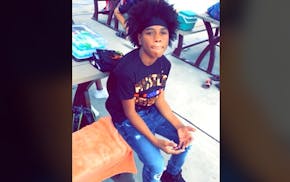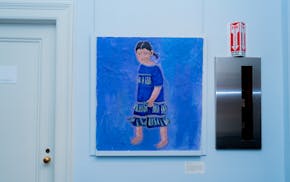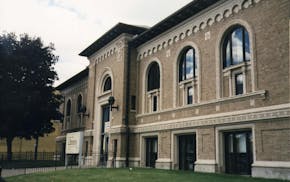In "The Stars and the Blackness Between Them," Junauda Petrus writes about two young Black women who build a bond that changes their lives.
"I often say this is a love letter to Minneapolis," she said earlier this year. "It follows the relationship of a Black girl who is sent up from Trinidad to live with her Black-American dad. The [Trinidadian] girl is Audre.And they begin this magical celestial friendship that does a lot to heal them both. It's a book that connects the diaspora. It's a queer love story. It's got romance and it talks about food a lot."
On Wednesday at 6:30 p.m. at Central Library in Minneapolis, I'll talk to Petrus — the new poet laureate for the city of Minneapolis — as part of an author talk for the Mary Ann Key Book Club, a partnership with Hennepin County Library, Friends of the Hennepin County Library and the Minnesota Star Tribune. To date, nearly 4,000 people have joined this reading and learning group that began in the months after the murder of George Floyd in 2020.
Folks often ask what they can do to spur change, and I always respond that education is the first step. Any act that's not rooted in education is nothing more than a fad diet: It won't stick. And education also informs choices. I didn't start a book club because I believed every member could change the world. I did — and still — believe that we have the strength to change our own, though.
In the months and years that followed Floyd's murder, there were a lot of decisions made in the name of change that did not last because they were not birthed by educated ambitions. That's — in part — why they were hollow. If you do not know why the suffering and history of marginalized communities matter, then there will be no long-lasting commitment to address those issues. That's what happened in the Twin Cities and beyond. People took stances, until they realized they didn't really care that much. Because they never sought to understand the historic damage those communities have had to carry over generations.
But Petrus offers a perspective in her book that emphasizes the love, the community, the spirituality, the trauma, the joy of a queer journey for two young Black women, Audre and Mabel. It's a tale that has the power to encourage empathy for the LGBTQ community, which does not always receive it.
After her relationship with a pastor's daughter is discovered by her disapproving mother, Audre is sent to live with her father — a father she does not know well — in Minneapolis, which is where she meets Mabel, who is also grappling with both the trials of youth and a severe illness. The displacement of Audre due to her sexuality reveals a reality for so many young LGBTQ community members.
"When we get home, the yelling and lashes start back, and when she get fed up with me, I was sent to my room," Audre says in her Trinidadian dialect about her mother's reaction. "I hear her and [her husband] talking in the other room when he get home late from work. He barely seem like he around but you feel his influence nonetheless in this house. I felt alone in my house. I felt like I was her enemy and not she only child."
When I was young, I had a cousin who only visited the homes of specific family members because he did not feel welcome after he announced that he was gay. The love he'd sought was not always available to him and his partner.
LGBTQ youth have an increased risk of homelessness and other challenges, statistics show.
According to the National Network for Youth: "Research has shown that those who identify as lesbian, gay, bisexual, transgender, or questioning (LGBTQ+) have a 120% higher risk of experiencing some form of homelessness. … They are also more likely to experience assault, trauma, depression, and suicide when compared to non-LGBTQ+ populations while also being homeless. These statistics are even worse for Black and Indigenous People of Color (BIPOC) LGBTQ+ populations who suffer from racial inequities and discrimination."
The conversation about LGBTQ youth should emphasize that the lack of acceptance so many encounter can have life-or-death consequences.
But the characters in Petrus' book use love, transparency and honesty to create a new home for themselves, one anchored by their connection.
"I feel like this is a book I really wanted to show the power of tenderness, the power of being there for people's hearts, being there for people's journeys, receiving love, receiving care," Petrus said.
![George Floyd's daughter Gianna Floyd, 6, looks to her mother Roxie Washington during a press conference at Minneapolis City Hall. ] LEILA NAVIDI •](https://arc.stimg.co/startribunemedia/WSDMNXVK3VZJDLDP3BTMCSMXNU.jpg?h=91&w=145&fit=crop&bg=999&crop=faces)
Medcalf: Hateful comments made after recent column on George Floyd's daughter left me discouraged

Medcalf: This summer, let's all be more vigilant about our children — and everyone else's

Medcalf: Mia program provides safe space for young people to create

Medcalf: George Floyd's daughter, now 11, on life without her dad: 'It's hard'


